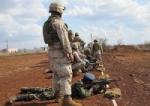The blood in his eyes almost blinded him, but the Navy Seal could hear, clattering above the trees in northeast
Afghanistan, rescue helicopters.
Hey, he pleaded silently.
I'm right here.
Marcus Luttrell, a fierce, 6-foot-5 rancher's son from
Texas, lay in the dirt. His face was shredded, his nose broken, three vertebrae cracked from tumbling down a ravine. A
Taliban rocket-propelled grenade had ripped off his pants and riddled him with shrapnel.
As the helicopters approached, Luttrell, a petty officer first class, turned on his radio. Dirt clogged his throat, leaving him unable to speak. He could hear a pilot: "If you're out there, show yourself."
It was June 2005. The
United States had just suffered its worst loss of life in Afghanistan since the invasion in 2001. Taliban forces had attacked Luttrell's four-man team on a remote ridge shortly after 1 p.m. on June 28. By day's end, 19 Americans had died. Now U.S. aircraft scoured the hills for survivors.
There would be only one. Luttrell's ordeal -- described in exclusive interviews with him and 14 men who helped save him -- is among the more remarkable accounts to emerge from Afghanistan. It has been a dim and distant war, where after 5 1/2 years about 26,000 U.S. troops remain locked in conflict.
Out of that darkness comes this spark of a story. It is a tale of moral choices and of prejudices transcended. It is also a reminder of how challenging it is to be a smart soldier, and how hard it is to be a good man ...







Bookmarks